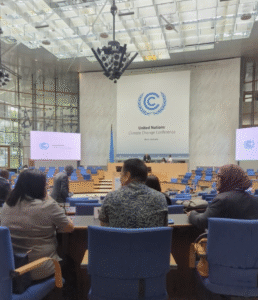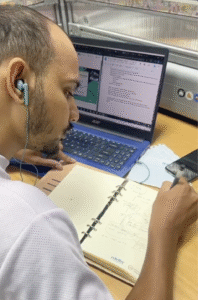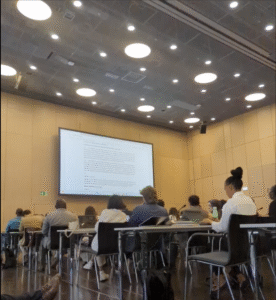Written by: Jinghann Hong, Yashirdisai Sampasivam, Neoh Ying Rui
Edited by: Jinghann Hong and Hanis Alwani
The Malaysian Youth Delegation (MYD) is a volunteer-based civil society organisation committed to representing Malaysia’s local youth climate movement and enhancing awareness of climate policies among Malaysians.
In June 2025, MYD had the opportunity to attend the 62nd session of the Subsidiary Bodies (SB62) in Bonn, Germany under Party Overflow badges. Three MYD representatives closely followed negotiation tracks on Article 6.2 (Cooperative approaches), Article 7 (Global goal on adaptation) and climate finance (Article 9.1, Baku to Belem Roadmap, Adaptation Fund).
The views and observations in this report are those of the authors and do not reflect the official positions of the Malaysian government. With respect to Malaysia’s negotiating position, Malaysia aligns with the positions of the G77+China bloc. Learn more about this negotiating group here.
This sharing presents a summary of the key outcomes, processes, and insights from these tracks. For exact language on Paris Agreement text, refer here.
1. Article 6.2 on cooperative approaches
→ Read more in this presentation here.

Article 6.2. (Source)
The context before this is…
Article 6 of the Paris Agreement allows countries to cooperate voluntarily to achieve their nationally determined contributions (NDCs), aiming for higher ambition in climate action while ensuring sustainable development and environmental integrity. More than three-quarters of Parties have indicated plans to use some form of cooperation under Article 6, with Article 6.2—the part on trading emissions bilaterally; this process requires robust accounting to avoid double counting and ensure transparency—being the most frequently communicated.
The SB62 negotiations particularly focused on…
How Article 6 cooperation can enable higher ambition in NDCs, whether these ambitions align with the goals of the Paris Agreement, and the challenges and capacity-building needs to ensure robust, transparent markets with environmental integrity. This dialogue was the first under the full implementation of Article 6, following the COP29 agreement on its operationalization.
The outcome of SB62 was…
The dialogue highlighted the growing recognition of Article 6’s dual role: facilitating cost-effective NDC implementation and mobilizing large-scale finance, including from the private sector. It helped clarify how cooperative approaches can support stronger climate targets while identifying remaining gaps and needs for transparent governance and capacity building.
2. Article 7 on the global goal on adaptation
→ Read more in this presentation here.
The context before this is…
The Global goal on adaptation (GGA) was established under Article 7 of the Paris Agreement to enhance adaptive capacity, strengthen resilience, and reduce vulnerability to climate change, contributing to sustainable development and ensuring an adequate adaptation response in the context of the temperature goal referred to in Article 2. At COP28, the UAE Framework for Global Climate Resilience was adopted, providing a foundation for pursuing shared adaptation targets. Subsequently, the UAE–Belém Work Programme on Indicators was launched to develop a set of indicators to assess progress towards the GGA. Parties provided guidance on the structure and modalities of the work programme at SB 60.
The SB62 negotiations particularly focused on…
Discussions centered on advancing the operationalization of the GGA, particularly through the UAE–Belém Work Programme on Indicators. Parties, technical experts, and non-Party stakeholders engaged in workshops and consultations to refine and finalize guidance to be given to experts to narrow down a list of indicators to assess adaptation progress. The aim was to ensure that these indicators are manageable, no more than 100, and aligned with the objectives of the Paris Agreement.
The outcome of SB62 was…
While progress was made, the final outcome was a decision to continue the work on the GGA indicators. Parties agreed to finalize the list of indicators through expert meetings and peer reviews held between SB62 and COP30. Therefore, no comprehensive agreement on the GGA was reached at SB62. Discussions on the Baku Adaptation Roadmap and transformational adaptation were deferred to future sessions, with the expectation that they will be addressed at SB63/COP30.
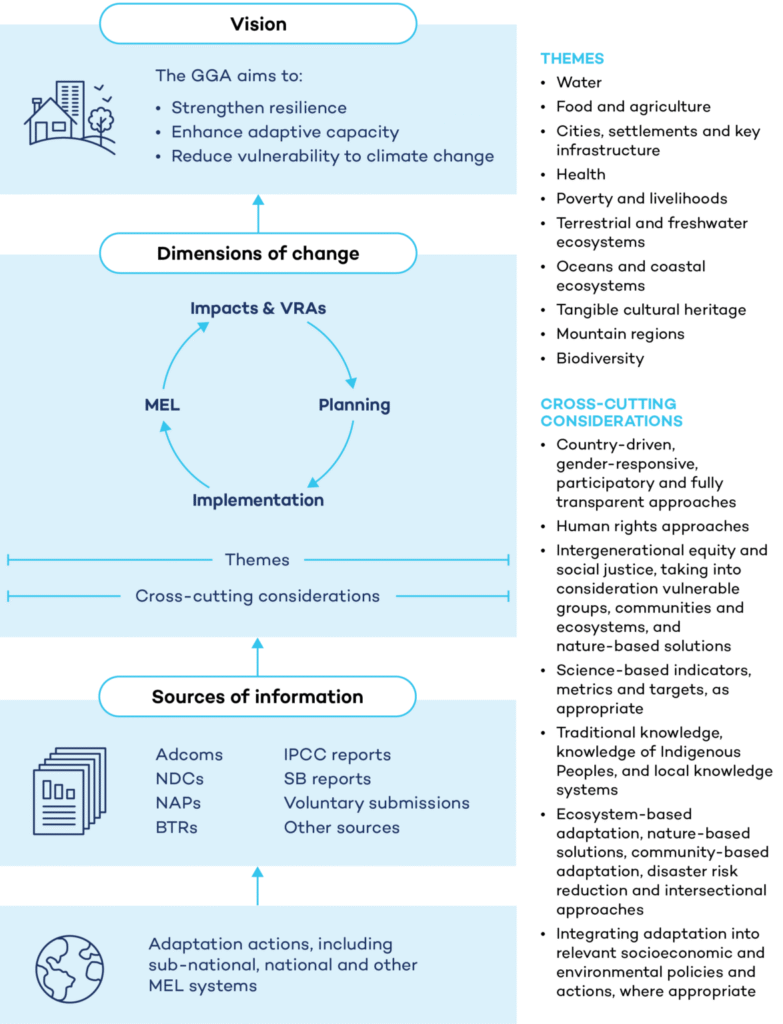
The GGA is intended to be a global MEL system for adaptation actions. (Source)
3. Climate finance
→ Read more in this presentation here.
The context before this is…
Climate finance serves as an essential enabler for implementing climate action, especially for projects in developing countries. Article 9 of the Paris Agreement states that developed country Parties shall provide financial resources for mitigation and adaptation to developing country Parties. This obligation arises from the former’s historical emissions and greater capacity, while developing country Parties remain disproportionately vulnerable to climate impacts.
Yet despite numerous pledges and targets over the years, delivery has often fallen short of expectations. At COP29, Parties agreed on the New Collective Quantified Goal (NCQG), which sets a new global target of USD 1.3 trillion per year by 2035, with USD 300 billion dedicated for adaptation and loss and damage. Following this, Parties’ attention focused on how to make this goal a reality through the implementation of the Baku to Belém Roadmap.
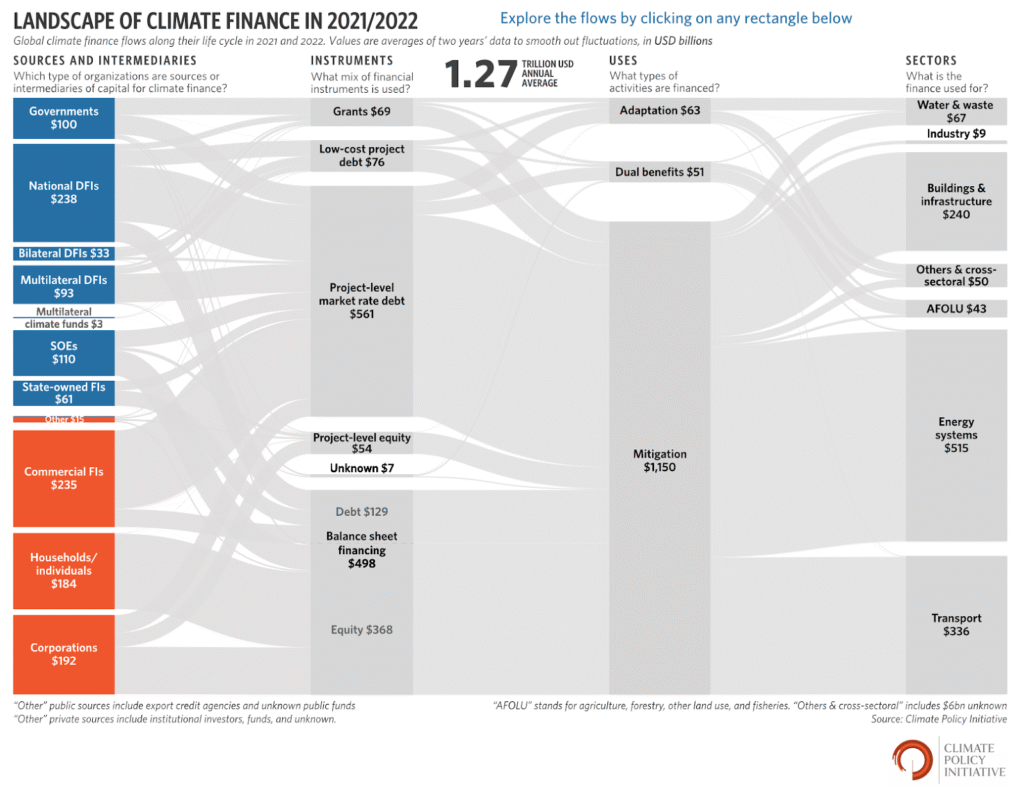
Global landscape of climate finance in 2023 (Source). For a more comprehensive breakdown, please refer to the 2024 Report found here.
The SB62 negotiations particularly focused on…
Discussions on climate finance took place across several agenda items and formats, primarily through the Baku to Belém Roadmap consultations and informal negotiations on the Adaptation Fund. Although there was an initial debate on establishing a standalone agenda item under Article 9.1, thus causing a delay in SB62 proceedings, Parties eventually agreed to address climate finance-specific issues across the spaces aforementioned above.
The Baku to Belém Roadmap consultations focused on how to operationalise the NCQG by 2035, with discussions highlighting the need for accountability, equitable burden-sharing and innovative finance sources (e.g., carbon market revenues and debt-for-climate swaps). In parallel, Adaptation Fund negotiations discussed its transition to serve the Paris Agreement exclusively, moving its establishment under the Kyoto Protocol in 2010. This included options for trustee and secretariat arrangements and the initiation of its 5th review to ensure institutional continuity and alignment with the Paris framework.
The outcome of SB62 was…
Parties agreed to continue discussions at SBI63 based on the informal notes and progress made in SB62. Key elements to be carried forward to COP30 include clarifying pathways for implementing the USD 1.3 trillion NCQG through the Baku to Belém Roadmap, advancing the Adaptation Fund’s transition under the Paris Agreement, and addressing the long-standing difficulties of predictability, accessibility and accountability in climate finance.
Concluding thoughts
Youth will inherit the earth from those who came before us, and when we are no longer youth, we will pass it on to those yet to come. Our involvement, therefore, underscores the principle of intergenerational equity: those who will face the consequences of climate change must have a voice in shaping the decisions that affect their future. Youth perspectives are inherently future-focused, offering a lens that emphasizes long-term solutions.
While youth representation has increased, nonetheless youth voices are still underrepresented in formal decision-making (source). Youth involvement in international arenas is also not without its challenges; read here the experience of our MYD Advisor Farhana Shukor, who reflects on the limitations she faced and the determination that keeps her advocating for meaningful youth engagement.
We therefore extend our sincere gratitude to the Ministry of Natural Resources and Environmental Sustainability (NRES) for this generous provision, which has enabled youth representation in critical international climate negotiations. It is our hope that this sharing not only encourages greater youth participation and engagement in international climate processes, but also promotes transparency, accountability, and intergenerational equity in climate policymaking.

